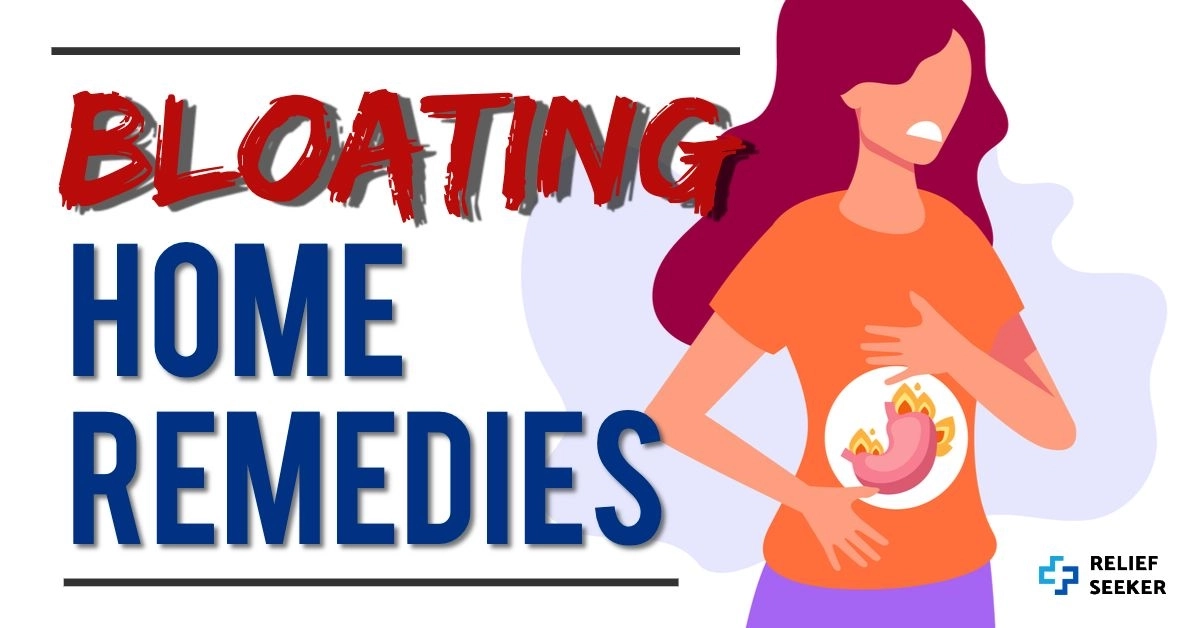Bloating is caused by excess air, gas, or water in the system. It’s often the result of hormonal fluctuations, food sensitivities, or eating too many processed foods.
While bloating isn’t necessarily a cause for concern, it can be a sign of more serious health conditions that could worsen if left untreated. It can also curtail weight loss and lead to tight-fitting clothes and abdominal pressure.
The good news is that you don’t (usually) need to take pricey prescriptions or undergo costly medical procedures to cure bloating. You can find most of these bloating home remedies right in your pantry, and they’ll help you release excess water and gas.
What Causes Bloating?
Bloating is generally caused by gas or air trapped in your digestive tract — or, as the result of retaining water.
When you’re bloated, you may feel puffy, lethargic, or like you’ve gained a few pounds. The good news is that any weight gained as the result of bloating isn’t permanent (and should go away after your bloating does).
Gas/Swallowed Air
One of the most common causes of bloating is gas. There are myriad reasons why you might suffer from gas, the largest of which is swallowed air.
When you swallow air, it becomes trapped in your digestive system, causing bloating and pressure. The easiest way to avoid this type of gas is to simply avoid swallowing air!
The most common reasons for swallowing air include drinking carbonated beverages, chewing gum, and wearing loose dentures. If your dentures are too loose for your mouth, you may want to get fitted for tighter-fitting dentures. You may also want to avoid chewing gum and drinking carbonated beverages.
Symptoms of swallowed air include belching, gas, excess flatulence, and belly bloat.
Water Retention
Another common cause of bloating is water retention. This is when your body holds onto excess water (instead of letting it go through urine or sweat).
There are several reasons why your body might retain water. This commonly happens when you eat too much salt (or salty, processed foods), if your hormones are fluctuating, or if you're dehydrated.
Commonly, people who eat too much salt retain water because salt can increase the amount of water in your body (water that doesn’t get absorbed into your cells). To avoid this, simply drink more water and limit your salt intake.
Women often experience bloating when they menstruate, thanks to the surge of estrogen and progesterone throughout their cycles. Drinking water can help flush extra hormones and excess water.
When you’re dehydrated, you can also become bloated. Dehydration can lead to constipation and electrolyte imbalances. It can also slow digestion.
Constipation
Constipation happens when waste gets stuck in your digestive system or moves slowly through your digestive system. If you’re constipated for too long, symptoms may include discomfort, pain, pressure, and bloating. (Note that you should contact your doctor if your constipation lasts for longer than 48 hours.)
If you suffer from constipation, you may want to drink more water, exercise more, or take a laxative. Once your constipation subsides, you’ll probably notice that your bloating is no longer an issue either.
Sometimes constipation can be a symptom of a chronic issue or is caused by medication side effects. Talk to your doctor if your symptoms don’t subside.
Food Sensitivities
Another common cause of bloating is food sensitivities. Some people have a hard time digesting certain foods and experience gastrointestinal symptoms such as gas, pain, and bloating after eating such foods.
The most common food sensitivities include artificial sweeteners, dairy, wheat, seafood, and legumes. Yet, there is a long list of common food sensitivities that might cause your bloating.
The easiest way to find out if you have a food sensitivity is to get tested. At-home testing kit companies like EverlyWell sell food sensitivity tests. Simply follow the instructions and mail your sample to the lab. Results are available within a few days.
Artificial Sweeteners
Sugar alcohols (such as the ones found in artificial sweeteners like xylitol, stevia, and erythritol), may also cause bloating, gas, and diarrhea.
If you suffer from bloating and use fake sweeteners, you may want to take a break from these products for a few weeks. If your bloating subsides, your symptoms were probably caused by sugar alcohols.
Some people have a sensitivity to one fake sweetener (but for some reason can stomach others). If you use several different sweeteners, you may want to add a small amount of each sweetener back into your diet (wait a few weeks between sweeteners). If one sweetener causes the bloating, simply stop using it; if all sweeteners cause symptoms, you may want to quit fake sugars altogether.
Wheat and Dairy
Two of the most common food sensitivities are wheat and dairy sensitivities.
Wheat and dairy sensitivities are different from wheat and dairy allergies as well as lactose intolerance (see below). If you suffer from diarrhea, bloating, gas, constipation, or other gastrointestinal issues after eating these two ingredients, you may want to get tested for food sensitivities.
If wheat causes digestive tract issues, you may also want to get tested for a gluten allergy called celiac disease (see below).
Wheat, dairy, and gluten allergies are very different from wheat and dairy intolerances, just as all five differ from lactose intolerance.
Fruits and Veggies
Some people have sensitivities to certain fruits and vegetables. Many of these sensitivities are the result of oral allergy syndrome, a reaction to the proteins in certain foods related to seasonal allergies.
Some of the most common fruits and veggie sensitivities include strawberries, apples, mangoes, bananas, and avocados. Symptoms of this condition may include bloating, diarrhea, hives, itching, vomiting, and abdominal pain.
If you think you may have oral allergy syndrome, you’ll want to get tested for seasonal allergies, such as dust, pollen, grass, and ragweed allergies, as these allergies are linked to this condition.
You can get tested for seasonal allergies at your doctor’s office or with an at-home test kit.
Lactose Intolerance
Lactose intolerance (which differs from dairy allergies and dairy intolerance) is common in children as well as people of African and Asian descent. Some indigenous people also have higher rates of lactose intolerance.
This condition is when your body cannot break down lactose, a carbohydrate found in dairy. If you suffer from lactose intolerance, your body doesn’t make enough lactase, which is the enzyme that helps break down this carbohydrate.
People that suffer from lactose intolerance may be able to eat dairy products with lower levels of lactose (such as goat’s milk and cheese) or lactose-free dairy.
As lactose intolerance differs from dairy sensitivities and allergies, you’ll need to get tested for all three issues separately.
Irritable Bowel Syndrome
Irritable bowel syndrome (IBS) can also cause bloating, diarrhea, constipation, gas, and other gastrointestinal issues. While the cause of IBS is unknown, it’s usually linked to gastrointestinal issues such as food sensitivities (especially to FODMAPs) and celiac disease.
If you’re worried that you might suffer from food sensitivities, gluten intolerances, you simply need to get tested for these issues, either at a testing center or with an at-home testing kit.
Complex Carbohydrates
For some people, complex carbohydrates, such as beans, cabbage, and cruciferous vegetables can make them gassy and bloated.
You may want to avoid such foods; or, simply take an over-the-counter remedy, such as Beano before eating them.
Symptoms of Bloating
The most common symptoms of bloating include abdominal pressure, tight-fitting clothes, and puffy face and skin. We can almost always detect when we’re bloated simply by the way our bodies feel.
Other common symptoms of bloating might include abdominal pain, indigestion, flatulence, excessive burping, and water weight gain.
Since bloating is caused by gas, air, or water trapped in the body, your skin may look puffy and you may feel lethargic.
If your symptoms are accompanied by more serious symptoms (such as blood in your bowel movements or urine), you should contact your doctor or urgent care provider immediately to rule out any life-threatening conditions.
Bloating Home Remedies
If you suffer from occasional bloating, you may be able to treat this condition with a home remedy. Luckily, there are plenty of ways to reduce gas, constipation, and bloating at home. You may even have some of these remedies in your kitchen pantry already.
You should always talk to your doctor about any abdominal bloating issues before trying at-home remedies. People with diabetes, heart conditions, or other chronic conditions (or anyone on medications) should never use at-home remedies before talking to a medical professional.
At-Home Food Sensitivity Kit
If you think you may have a food sensitivity or oral allergy syndrome, you’ll want to get tested. At-home test kit companies can send a test kit right to your home or office.
Follow the instructions to take your blood or saliva sample. Send your sample to the lab, and get your results in just a few days.
If you test positive for possible food sensitivities, you’ll want to remove those foods from your diet for at least one month before reintroducing each food one-by-one (spaced out a few weeks apart) to see how your body reacts to each food.
Apple Cider Vinegar
Apple cider vinegar (ACV) may help ease bloating, constipation, and other gastrointestinal issues; yet, there is little scientific evidence to back up this claim. Most scientific research on ACV and gastrointestinal issues involve smaller studies with few participants.
There is some anecdotal evidence suggesting that ACV may help ease the symptoms of bloating and other gastrointestinal issues. As long as your doctor says it’s OK, you can try adding a tablespoon of ACV to salad dressings, mocktails, or juices.
It’s important to never consume straight ACV. This ingredient could potentially burn your esophagus or lead to other chronic health issues when consumed on its own.
Lemon Water
Lemon is a natural diuretic, making it another great bloating home remedy. Simply squeeze ¼ lemon (or two tablespoons juice) into a cup of warm or hot water. Sip the lemon water as you would tea.
Just don’t drink too much lemon water, as it can cause tooth enamel erosion, heartburn, and tooth decay.
Peppermint Oil & Tea
Peppermint is a known anti-inflammatory, which means it can help fight inflammation in your digestive tract.
This herbal supplement is available both in oil and tea form. Follow the instructions to add food-grade peppermint oil to hot beverages or snacks. Or, buy a tincture that you can place directly underneath your tongue.
If peppermint oil seems too complicated, peppermint tea is easy to make (simply pour boiling water over a tea bag) and works just as effectively as peppermint oil.
Supplements
Adding supplements and vitamins to your daily routine may also reduce bloating. Before taking vitamins and supplements, you’ll want to get tested for a vitamin and nutrient deficiency. Taking vitamins when you don’t have a deficiency can lead to an overabundance in your system (which can lead to serious issues, including bloating). At-home test kit companies can test for these deficiencies.
Potassium is known to help fight belly bloat, and some people suffering from this condition have a potassium deficiency.
You may also want to try digestive enzymes such as probiotics. If you already take probiotics and are still suffering from bloating, you may want to try an enzyme specifically for belly bloat such as HUM’s Flatter Me, Digestive Enzyme.
Lifestyle Changes
If you suffer from chronic bloating, you may also want to switch up your habits a bit. Sometimes poor habits (such as not drinking enough water or exercising and eating lots of processed foods) can cause chronic bloating.
A few of the most common lifestyle changes to help ease bloating include:
Exercising for at least 30 minutes a day
Drinking at least eight glasses of water a day
Avoiding salty foods
Eating foods that support your digestive system
Quitting smoking, drugs, or other stimulants
Getting seven-to-eight hours of sleep each night
It’s always best to talk to your doctor if you’re suffering from chronic bloating, as this condition could be indicative of more serious chronic conditions.


